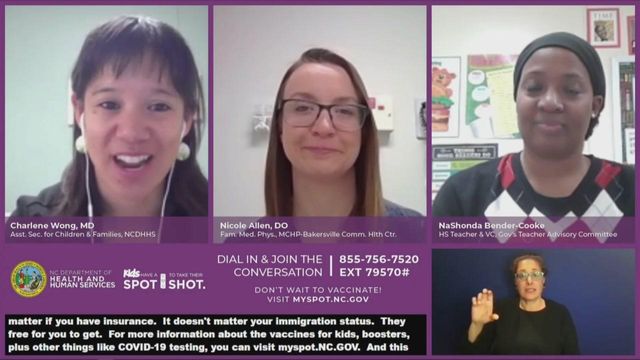NCDHHS: Few children have received COVID vaccine in NC
Many children in North Carolina over the age of five remain unvaccinated despite the widespread availability of vaccines.
Posted — UpdatedOnly 27% of North Carolina children between the ages of five and 11 have received at least one dose of the coronavirus vaccine and less than 50% of all children between 11 to 17 have received at least one dose, according to the state Department of Health and Human Services.
"A lot of kids are still vulnerable to getting the virus, getting sick and having any long-term symptoms that an infection may cause," said Charlene Wong, assistant secretary for children and families with NCDHHS.
Wong spoke during a fireside chat Thursday hosted by NCDHHS to encourage parents to get their children vaccinated. As many school districts across central North Carolina choose to stop requiring students to wear masks, getting students vaccinated is important to keep them in school, health leaders said.
Nicole Allen, a family medicine physician, stressed that the side effects of the COVID-19 vaccine in children is very mild -- more mild than any other virus "floating around right now."
According to data from the Pfizer COVID-19 vaccine trial, a low dose of the vaccine offered children strong protection against the virus. Vaccines also offer more protection against coronavirus and its different strains when compared to a previous infection, Wong said.
While the number of people hospitalized with COVID-19 in North Carolina has fallen in recent weeks, the portion of people in the hospital who are children has not. Around 20 children are currently hospitalized with the virus.
Addressing parents' concerns over COVID-19 vaccine side effects
Allen said that many parents come to her concerns with her of myocarditis, an inflammation of the heart muscle, that has been reported in children who have received the COVID-19 vaccine. But Allen stressed that chance was less than .01% and most of the children affected were older. All of the children that reportedly suffered from the condition recovered within a few days.
Parents also are concerned about the impact that the vaccine has on their children's fertility.
"There is no way that the mRNA vaccine can change one's DNA," Allen said.
For mothers who are pregnant and concerned about the health of their future children, Allen said the best thing they can do is get vaccinated. Research shows that women who receive a vaccine, especially in their third trimester, are able to pass along COVID-19 protection to their child. One study showed that majority of babies hospitalized with COVID-19 shortly after being born were birthed by unvaccinated mothers.
"So far, the data available and easily accessible for anyone to look at appears very promising," Allen said. "Seek somebody who you trust to really validate what you are reading."
'Concerning' long-term symptoms of COVID-19 in children
"We're really just now starting to get a good understanding of the effects of long-COVID," Allen said. "The vaccine, or any vaccine, is not a bulletproof vest but it is the best weapon to decrease your kid's risk of getting COVID and the devastating side effects."
Allen emphasized that there are many studies that prove COVID-19 vaccines in children additionally protect against these long-term symptoms.
Studies show that up to 30% to 40% of children will experience long-term symptoms including fatigue, brain fog and breathing issues, Wong said.
"For some of these children, like adults, we are seeing these types of life-altering symptoms, bothersome symptoms, lasting for a really long time," Wong said. "And we don't have a lot of good treatment."
The "concerning" symptoms of long-COVID prevents children from being able to participate in school and sports, Wong said.
• Credits
Copyright 2024 by Capitol Broadcasting Company. All rights reserved. This material may not be published, broadcast, rewritten or redistributed.






